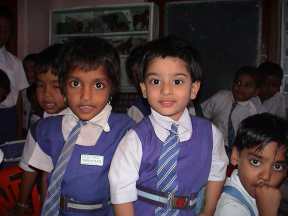September 18, 2006
Low-cost schools in poor nations seek investors
James Tooley writes in the Financial Times:
Poor parents are abandoning public schools en-masse, to send their children to “budget” private schools that charge low fees – perhaps one or two dollars per month, affordable even to parents on poverty-line wages. In the shanty towns of Lagos, Nigeria, for example, or the poor, rural areas surrounding Accra, capital of Ghana, or the slums of Hyderabad, India, the majority of schoolchildren – between 64 and 75 per cent – are enrolled in private schools. In impoverished districts in south India, half of all schoolchildren are privately enrolled. Even in remote areas of China, huge numbers of private schools exist off the official radar.
So why the preference for private schools?
My recent research has shown that private schools for the poor are superior to government schools – teachers were much more likely to be teaching when we called unannounced in their classrooms. Private schools were, in general, better equipped with drinking water and toilets. Testing about 24,000 children we found academic achievement was much higher in private than government schools. All of this was accomplished for a fraction of the per-pupil teacher cost.
...They do not want government schools, where teachers do not turn up or, if they do, they do not teach. They want private schools, where teachers are accountable to them through the school principal. Extending access to these schools can be easily effected through vouchers aimed at those, such as Amaretch, whose parents cannot afford a private school.
And what are the bennefits and potential of a for-profit approach?
Because these private schools for the poor are generally businesses, not charities, a creative new frontier for investors is opened up to help improve the quality of education, too. To help school proprietors improve their infrastructure, the opportunity is there for microfinance companies to get involved. We set up two pilot loan schemes, in Hyderabad and Lagos, offering loans of $500-$2,000, at commercial interest rates, to help school entrepreneurs build latrines, refurbish classrooms or buy land. The schools, not having formal property rights or operating semi-legally, were hungry for this kind of finance.
Investors can help improve the quality of learning, too. Aid agencies have thrown billions at trying to get schools to improve their curriculums or teaching. These interventions are not sustainable and fade away as soon as the donor-funded experts move on… However, private schools are operating in intensely competitive markets. They are hungry, too, for innovation if it can be shown to improve standards, to increase market share. Investors can back research and development to find out what works to improve educational outcomes in these schools, then partner with entrepreneurs to ensure that successful methods are brought to market. The problems of sustainability and scalability that so bedevil any aid intervention are solved
…Entrepreneurs who have created private schools serving the poor are eager for investment; they are waiting for the investors who can assist them in pursuing their central role in providing quality “education for all”.
Tooley is probably the leading specialist in private participation in private education in developing countries. This article is an excerpt from
his longer essay that won the first IFC-FT Essay Competition on the role of the private sector in development. For more, see the
E.G West Center and his
personal homepage. Also see an earlier posts on
public vs. private education in China.
Update: See this FastCompany debate asking whether
for-profit companies should run public schools. And
Derek Newberry has more comment on Tooley's essay.
Update: See all of the
IFC-FT essay winners.








